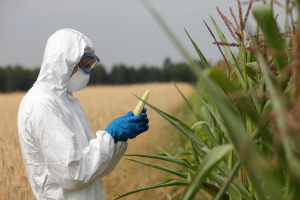Non-Organic Crops Are About to Become Much More Toxic
 When Monsanto first released their Roundup Ready crops, which are seeds that have been engineered to withstand the company’s trademark pesticide, most farmers rejoiced. After all, this meant that they could eliminate weeds without having to worry about damaging their crops. And as an added bonus, it was thought at the time that these GMOs would reduce pesticide use; a notion that is laughable in retrospect.
When Monsanto first released their Roundup Ready crops, which are seeds that have been engineered to withstand the company’s trademark pesticide, most farmers rejoiced. After all, this meant that they could eliminate weeds without having to worry about damaging their crops. And as an added bonus, it was thought at the time that these GMOs would reduce pesticide use; a notion that is laughable in retrospect.
The application of glyphosate around the worldhas increased 15 fold since these Roundup Ready crops were first introduced in the 1990s. These days US farmers are applying 300 million pounds of glyphosate to their crops every year, which is staggering when you consider that they were only using 11 million pounds per year in the 1980’s. However, this usage rate as less to do with popularity and more to do with necessity.
Roundup Ready crops have created a problem in agriculture that is similar to the problems caused by antibiotics, whose overuse has bred highly resistant strains of superbugs. The overuse of glyphosate has bred superweeds, which are resistant to the pesticide. And the more resistant they become, the more pesticides that farmers have to apply. It’s an endless cycle that farmers have no idea how to break out of. The problem just keeps getting worse and worse as the years go by. There are now 100 million acres of crops in the United States that contain superweeds.
So if Monsanto caused this problem, do they have a solution? Yep, and it’s the kind ofhorrifying solution that only Monsanto could come up with.
Monsanto’s own solution to this escalating problem would seem as laughably predictable as a bad Hollywood sequel if it weren’t all too real: Let’s roll out more GMO crops designed to withstand being doused with even more weed killer. Monsanto calls its next-generation line of GMO soybeans “Xtend,” and these are capable of not only surviving heavy applications of glyphosate but an older, more potent herbicide known as dicamba.Federal regulators have yet to approve the new dicamba-based weed killer Monsanto formulated to pair with its dicamba-resistant GMO soybeans. But that apparently hasn’t stopped some desperate farmers from spraying dicamba anyway. And because the chemical has a nasty tendency to drift to neighboring fields, Monsanto’s new GMO crops aren’t only upending the natural order, they appear to being upending the social order in tight-knit farming communities too: Neighbors are accusing neighbors of illegally spraying dicamba and killing off crops that haven’t been engineered to tolerate the chemical. Dozens and dozens of complaints have been filed in Missouri and in Arkansas, but that may only be the beginning in the next chapter of the Monsanto saga. If the company’s new herbicide wins federal approval and certain farmers start spraying it, surrounding farmers might have no choice but to plant Monsanto’s dicamba-resistant GMO crops too—or risk their own crops dying from herbicide drift.As one crop scientist at the University of Arkansas tells NPR: “[These farmers are] afraid they’re not going to be able to grow what they want to grow. They’re afraid that they’re going to be forced to go with that technology.”
It doesn’t take a rocket scientist to figure out where this is going. There’s going to be more pesticides on more crops, more superweeds, and a hell of a lot more money for Monsanto. As for the company’s new dicambe based pesticide, it hasn’t shown any potential to cause health problems in humans, but there also hasn’t been nearly as many studies on the chemical. When Roundup first came out for instance, everyone thought it was safe. Now it’s becoming more acceptable in the scientific community to admit that this stuff is super toxic. Until dicambe is used on a wider scale, we won’t really know what it’s capable of.
If you haven’t switched to organic food, consider this a wake-up call. America’s food supply is probably about to become more toxic than any of us could have imagined.
Joshua Krause was born and raised in the Bay Area. He is a writer and researcher focused on principles of self-sufficiency and liberty at Ready Nutrition. You can follow Joshua’s work at ourFacebook page or on his personal Twitter.
Joshua’s website is Strange Danger


No comments:
Post a Comment